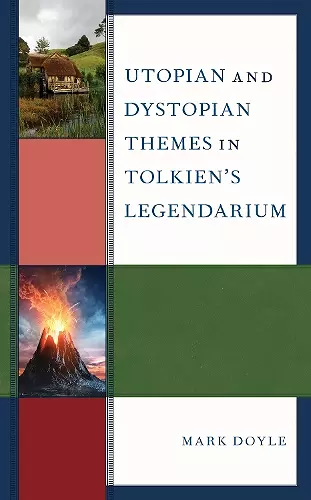Utopian and Dystopian Themes in Tolkien’s Legendarium
Format:Paperback
Publisher:Bloomsbury Publishing PLC
Published:3rd Feb '22
Currently unavailable, and unfortunately no date known when it will be back
This paperback is available in another edition too:
- Hardback£76.50was £85.00(9781498598675)

Utopia and Dystopia in Tolkien’s Legendarium explores how Tolkien’s works speak to many modern people’s utopian desires despite the overwhelming dominance of dystopian literature in the twentieth and twenty-first centuries. It also examines how Tolkien’s malevolent societies in his legendarium have the unique ability to capture the fears and doubts that many people sense about the trajectory of modern society. Tolkien’s works do this by creating utopian and dystopian longing while also rejecting the stilted conventions of most literary utopias and dystopias. Utopia and Dystopia in Tolkien’s Legendarium traces these utopian and dystopian motifs through a variety of Tolkien’s works including The Hobbit, The Lord of the Rings, The Silmarillion, Book of Lost Tales, Leaf by Niggle,and some of his early poetry. The book analyzes Tolkien’s ideal and evil societies from a variety of angles: political and literary theory, the sources of Tolkien’s narratives, the influence of environmentalism and Catholic social doctrine, Tolkien’s theories about and use of myth, and finally the relationship between Tolkien’s politics and his theories of leadership. The book’s epilogue looks at Tolkien’s works compared to popular culture adaptations of his legendarium.
Like his religious thought, Tolkien’s sophisticated political ideas on the organization and governance of society are nuanced, rarely plainly stated, and best discovered through a close reading of his fictional texts. In this book, Mark Doyle demonstrates that while Tolkien was not writing explicitly in the utopian mode, many societies in Middle-earth and his other writings may be usefully read as utopian or dystopian, complicated at all times by the frailties and free will of the individuals constituting them.
Utopias and Dystopias traces influences on Tolkien’s political systems primarily from medieval and Victorian-medievalist sources, pre- and post-WWI modernity, environmental stewardship, his Catholic faith, and his strong sense of the fallenness of man and the dangerous temptations of the desire for power.
Mark Doyle’s Utopia and Dystopia in Tolkien's Legendarium contributes to the growing body of scholarly work demonstrating how deeply Tolkien’s literary imagination is rooted in social, ethical, philosophical, and religious traditions from the middle ages to the 20th century. In prose that is at once academically rigorous yet accessible to all readers, Professor Doyle gives the lie to naive assumptions that Tolkien’s legendarium as a whole springs from (or coddles) simplistic idealism or dewy-eyed romanticism. The author analyzes Tolkien’s works within the larger history of utopian and dystopian literary genres from Victorian medievalism to 20th-century modernism and postmodernism. Properly respectful that the sources of Tolkien’s environmental ethic are more religious and Catholic than secular and Romantic, Professor Doyle mediates the false dichotomy of pagan/Christian exposed in Claudio Testi’s Pagan Saints in Middle-earth and satisfyingly situates Tolkien’s religiously inspired environmentalism in the context of papal encyclicals touching on society, the good life, and the good creation of a good Creator. His book can be read profitably alongside Marc DiPaolo’s Fire and Snow and Susan Jeffers’s Arda Inhabited, whose themes are corroborated and extended in this book. Uniquely, Doyle explores elements of anarchism, distributionism, and Toryism in Tolkien’s political philosophy, which espoused an ethic of freedom that is not antinomian but recognizes that authoritarian controls aiming at the construction of utopias invariably have results opposed to their idealistic aims, to the detriment and destruction of the good. The book is essential. -- Jonathan Evans, University of Georgia
Blending historical analysis of Tolkien's medieval sourcing with hypercontemporary ecocritical insight, Mark Doyle's Utopia and Dystopia in Tolkien's Legendarium inaugurates a new age for the study of Lord of the Rings as it unpacks both the utopian impulses that have led so many readers to wish Middle-earth was their home and the ever-resurgent dystopian tendencies that threaten to conquer both that world and this one. -- Gerry Canavan, Associate Professor of 20th and 21st Century Literature, Marquette University, author of Octavia E. Butler
Doyle’s work is a piece of Tolkien scholarship that can offer new avenues of thought for Tolkien’s legendarium and diverging pathways with which Tolkien scholarship can further engage. * Fafn
ISBN: 9781498598699
Dimensions: unknown
Weight: unknown
204 pages